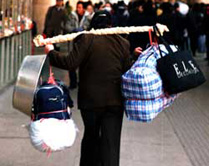 A joke popular with Chinese compares hukou, the household registration system, to the human appendix -- useless most of the time, but acutely painful when inflamed.
A joke popular with Chinese compares hukou, the household registration system, to the human appendix -- useless most of the time, but acutely painful when inflamed.
Launched in 1958, China's hukou system classes people as rural or urban residents and requires them to live and work in their places of permanent residence.
The policy was strictly observed in past years until about a decade ago, when -- with food security ensured -- the country loosened its restrictions and allowed some peasants to seek jobs in cities. In earlier years they could be arrested for doing this.
In the past decade, an estimated 100 million rural residents have migrated into cities to work, but because of their rural hukou, they have been denied equal access to jobs, welfare and legal protection.
Finding it hard to find decent jobs, many migrant workers did whatever they could to survive, usually heavy, dirty and badly paid jobs urbanites refused to do.
They have had to pay excessive fees for social services. And police can still summarily expel from cities those migrants without residence documents, the so called "floating population".
"Such categorization of people causes discrimination. It results in people being born with different status," said Feng Lanrui from the Chinese Academy of Social Sciences.
Full urban resident status means not only a better living standard, but also privileges such as government subsidies for those below the poverty line, a better educational environment, superior employment opportunities and social insurance. The farmers have only themselves to depend on.
Children in the countryside have to study hard to squeeze themselves into colleges which can help them gain an urban hukou, which is something city dwellers are born with.
Painstaking Efforts
Calls to eradicate the hukou system, which has restricted labour mobility and caused inequality among compatriots, have been frequently heard in recent years. Yet the operation to remove this 50-year-old system won't be as easy as an appendectomy.
Some reforms have been vigorously conducted in many parts of China.
The crucibles of hukou reform during this period have been the small urban centres, towns and small cities, which are also part of the country's urbanization strategy.
Last year China mandated that all urban areas at and below the small city-level (or having a population of less than 100,000) should grant urban hukous to rural residents with a fixed job and home in the city.
"This is unprecedented in China," Feng said.
"On the surface, the reforms simply change identification documents for a population of migrants who have already established themselves in China's urban centres. In a deeper sense, however, this change puts the social standing of qualified migrants on a par with urban residents and provides them with full access to the advantages of city living."
However, in the eyes of some experts, the current reforms are to some degree not so well conceived.
"They ignore the fact that the jobs available in small urban centres are insufficient. Most rural migrant workers have to travel to large cities in search of jobs," said Zhang Henian, a professor of demography with the Shanghai Social Sciences Academy.
An alternative approach, he argued, would be, first, to cease classifying hukous as urban and rural and, second, to allow Chinese to reside where they wish.
Cities would then grow "organically" as in other countries, dictated by the availability of work, housing and social services.
Irrational Fear
The main obstacles in the way of more liberal hukou reforms, according to many experts, is the fear among city leaders that their cities lack the capacity to support large inflows of rural migrants.
However, in Feng's eyes, the current overcrowding in cities is actually caused by the current rigid hukou system.
"Those who should leave are not allowed to leave, while those who can establish themselves in the city are kept out," Feng said.
The hukou system not only keeps rural people out of the city, it also restricts city residents who want to move to other cities.
Yet population mobility is an unavoidable accompaniment to economic development. The United States, Australia and China's Hong Kong have the world's largest floating populations. Far from seeing this population as a burden such regions benefit greatly from it as a source of prosperity.
Statistics show that in Shanghai and Beijing, 20 per cent of GDP is contributed by migrant workers.
As for the possibility of "blind floating" or chaotically drifting people, he argued that cities should allow higher living costs and taxes to sift out those without compelling economic purpose from residing in the major urban centres. Those unable to afford the expense of urban life would have to move out.
Admittedly, in the past 50 years, the hukou system has greatly helped in ensuring the country's social stability and maintaining order in cities by restraining the influx from countryside, preventing it from overwhelming urban employment, housing and social services.
However, is it right to sacrifice some people's opportunities in the name of social order?
There is no doubt every country needs order. But the problem is how to guarantee such order -- whether by constantly working to meet people's demands, or by tolerating oppressive controls, according to Feng.
(Shanghai Star March 12, 2003)
|

